Impact of UK Government Tourism Recovery Plan on TUI Group
VerifiedAdded on 2023/06/08
|10
|2535
|116
Case Study
AI Summary
This case study report examines the impact of the UK Government's tourism recovery plan on TUI Group, a major player in the travel industry. The report begins with an introduction defining the internal, micro, and macro business environments and their relevance to TUI. The main body of the report interprets the UK Government's tourism recovery plan, analyzing its positive and negative impacts on TUI's internal operations, micro-environment (customers, competitors, etc.), and macro-environment (political, economic, social, technological, environmental, and ethical factors). The analysis includes the effects of the COVID-19 pandemic on the tourism sector and the measures taken by the government to support the industry's recovery. The report utilizes STEEPLE analysis to assess the macro-environmental factors influencing TUI. The conclusion summarizes the findings, emphasizing the challenges and opportunities faced by TUI in the context of the recovery plan. The report also references relevant academic sources to support its analysis.
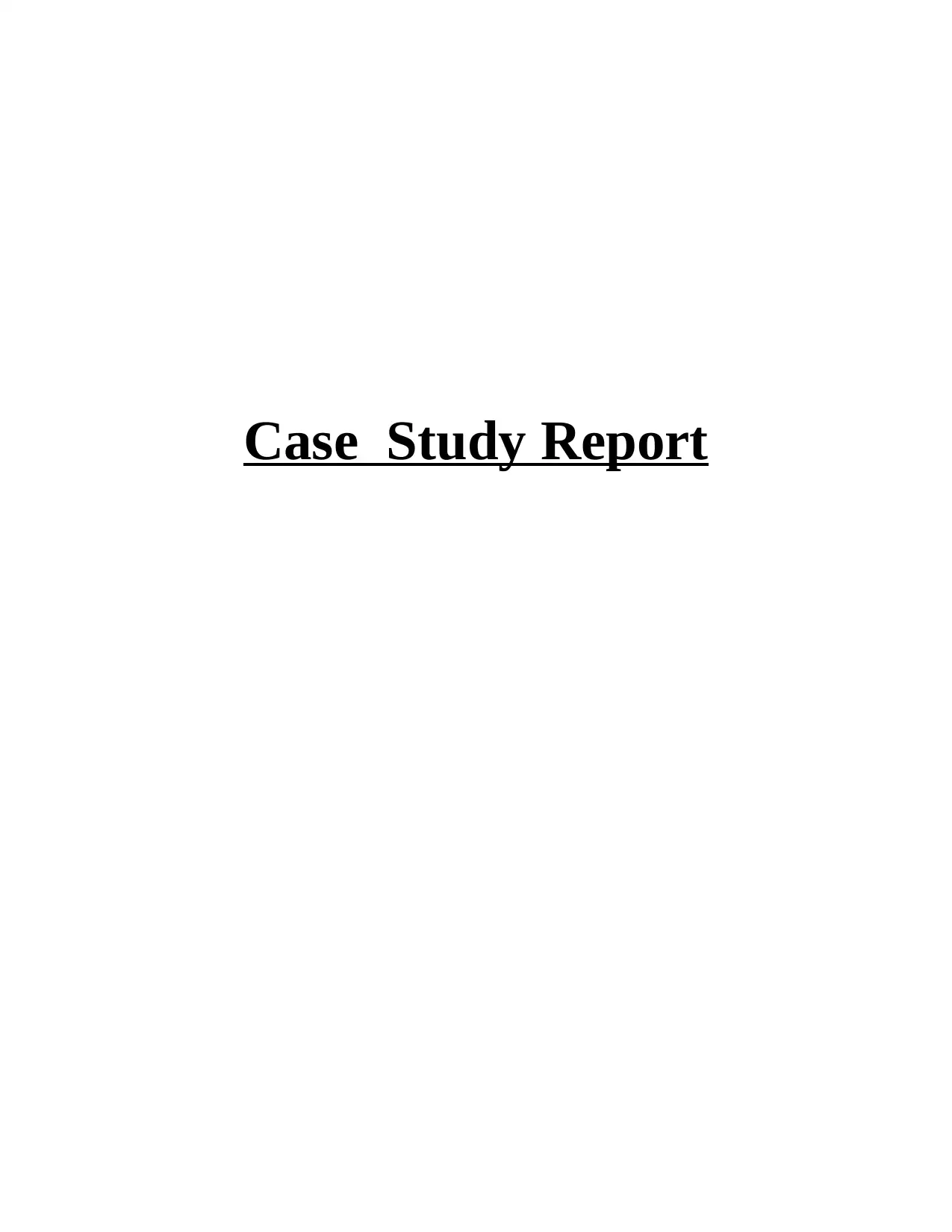
Case Study Report
Paraphrase This Document
Need a fresh take? Get an instant paraphrase of this document with our AI Paraphraser
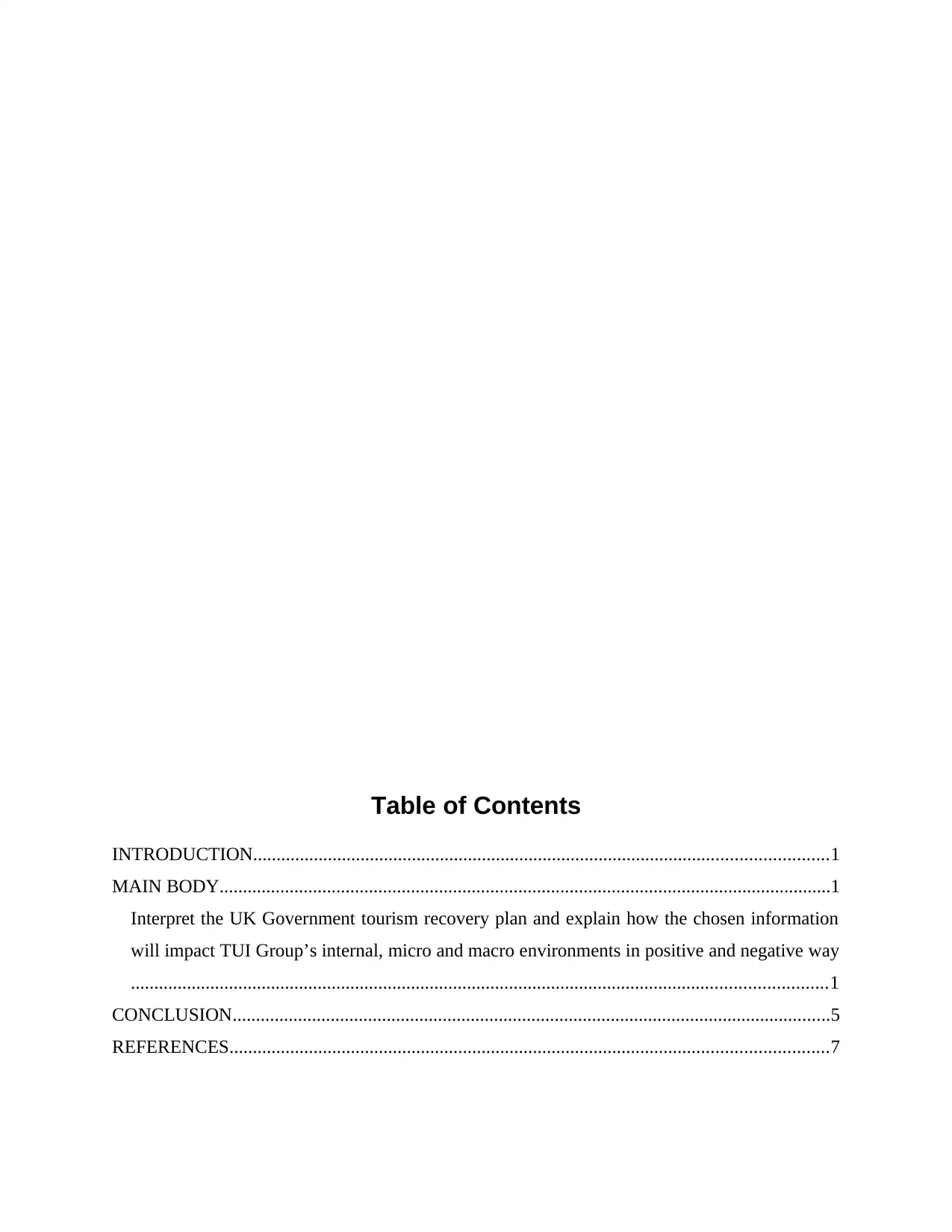
Table of Contents
INTRODUCTION...........................................................................................................................1
MAIN BODY...................................................................................................................................1
Interpret the UK Government tourism recovery plan and explain how the chosen information
will impact TUI Group’s internal, micro and macro environments in positive and negative way
.....................................................................................................................................................1
CONCLUSION................................................................................................................................5
REFERENCES................................................................................................................................7
INTRODUCTION...........................................................................................................................1
MAIN BODY...................................................................................................................................1
Interpret the UK Government tourism recovery plan and explain how the chosen information
will impact TUI Group’s internal, micro and macro environments in positive and negative way
.....................................................................................................................................................1
CONCLUSION................................................................................................................................5
REFERENCES................................................................................................................................7

⊘ This is a preview!⊘
Do you want full access?
Subscribe today to unlock all pages.

Trusted by 1+ million students worldwide
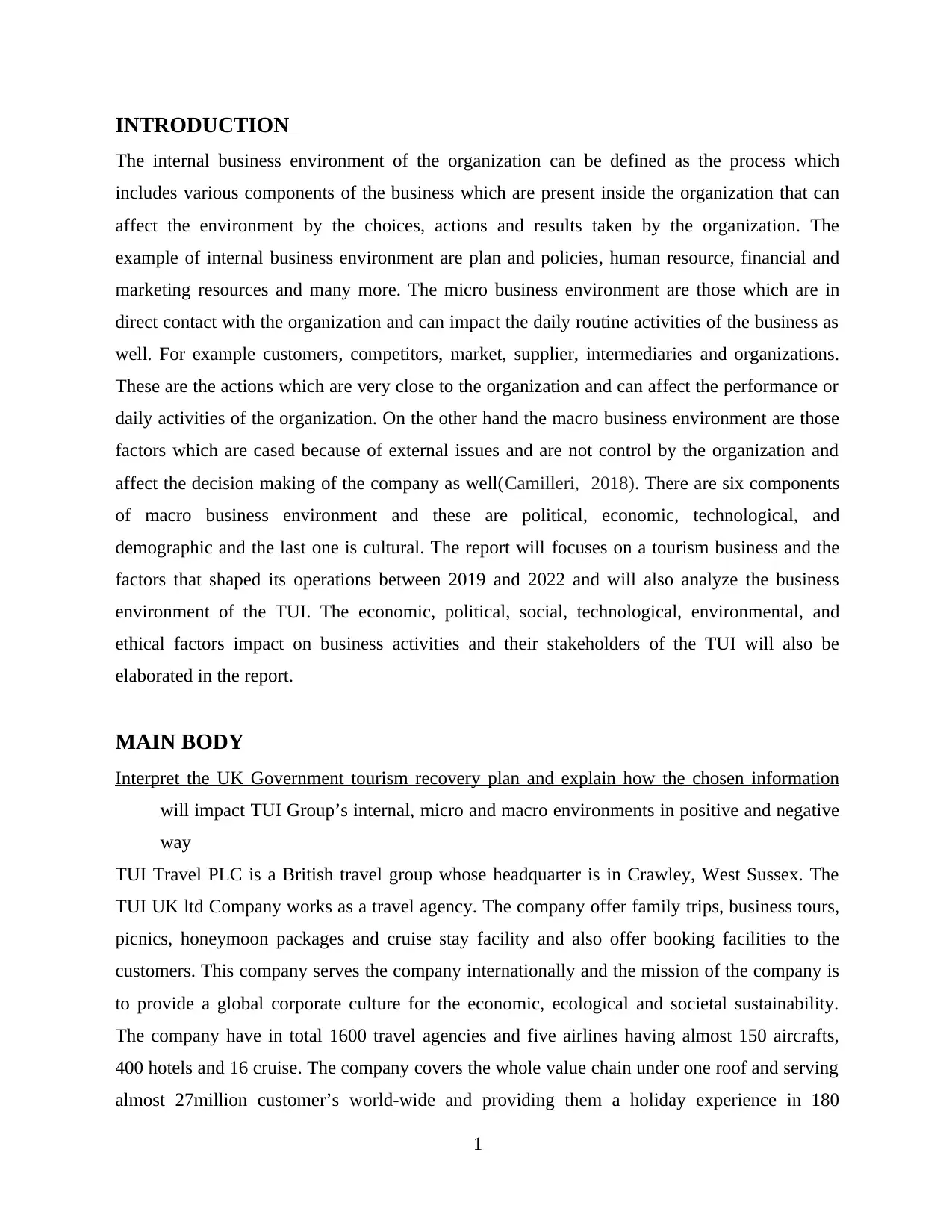
INTRODUCTION
The internal business environment of the organization can be defined as the process which
includes various components of the business which are present inside the organization that can
affect the environment by the choices, actions and results taken by the organization. The
example of internal business environment are plan and policies, human resource, financial and
marketing resources and many more. The micro business environment are those which are in
direct contact with the organization and can impact the daily routine activities of the business as
well. For example customers, competitors, market, supplier, intermediaries and organizations.
These are the actions which are very close to the organization and can affect the performance or
daily activities of the organization. On the other hand the macro business environment are those
factors which are cased because of external issues and are not control by the organization and
affect the decision making of the company as well(Camilleri, 2018). There are six components
of macro business environment and these are political, economic, technological, and
demographic and the last one is cultural. The report will focuses on a tourism business and the
factors that shaped its operations between 2019 and 2022 and will also analyze the business
environment of the TUI. The economic, political, social, technological, environmental, and
ethical factors impact on business activities and their stakeholders of the TUI will also be
elaborated in the report.
MAIN BODY
Interpret the UK Government tourism recovery plan and explain how the chosen information
will impact TUI Group’s internal, micro and macro environments in positive and negative
way
TUI Travel PLC is a British travel group whose headquarter is in Crawley, West Sussex. The
TUI UK ltd Company works as a travel agency. The company offer family trips, business tours,
picnics, honeymoon packages and cruise stay facility and also offer booking facilities to the
customers. This company serves the company internationally and the mission of the company is
to provide a global corporate culture for the economic, ecological and societal sustainability.
The company have in total 1600 travel agencies and five airlines having almost 150 aircrafts,
400 hotels and 16 cruise. The company covers the whole value chain under one roof and serving
almost 27million customer’s world-wide and providing them a holiday experience in 180
1
The internal business environment of the organization can be defined as the process which
includes various components of the business which are present inside the organization that can
affect the environment by the choices, actions and results taken by the organization. The
example of internal business environment are plan and policies, human resource, financial and
marketing resources and many more. The micro business environment are those which are in
direct contact with the organization and can impact the daily routine activities of the business as
well. For example customers, competitors, market, supplier, intermediaries and organizations.
These are the actions which are very close to the organization and can affect the performance or
daily activities of the organization. On the other hand the macro business environment are those
factors which are cased because of external issues and are not control by the organization and
affect the decision making of the company as well(Camilleri, 2018). There are six components
of macro business environment and these are political, economic, technological, and
demographic and the last one is cultural. The report will focuses on a tourism business and the
factors that shaped its operations between 2019 and 2022 and will also analyze the business
environment of the TUI. The economic, political, social, technological, environmental, and
ethical factors impact on business activities and their stakeholders of the TUI will also be
elaborated in the report.
MAIN BODY
Interpret the UK Government tourism recovery plan and explain how the chosen information
will impact TUI Group’s internal, micro and macro environments in positive and negative
way
TUI Travel PLC is a British travel group whose headquarter is in Crawley, West Sussex. The
TUI UK ltd Company works as a travel agency. The company offer family trips, business tours,
picnics, honeymoon packages and cruise stay facility and also offer booking facilities to the
customers. This company serves the company internationally and the mission of the company is
to provide a global corporate culture for the economic, ecological and societal sustainability.
The company have in total 1600 travel agencies and five airlines having almost 150 aircrafts,
400 hotels and 16 cruise. The company covers the whole value chain under one roof and serving
almost 27million customer’s world-wide and providing them a holiday experience in 180
1
Paraphrase This Document
Need a fresh take? Get an instant paraphrase of this document with our AI Paraphraser
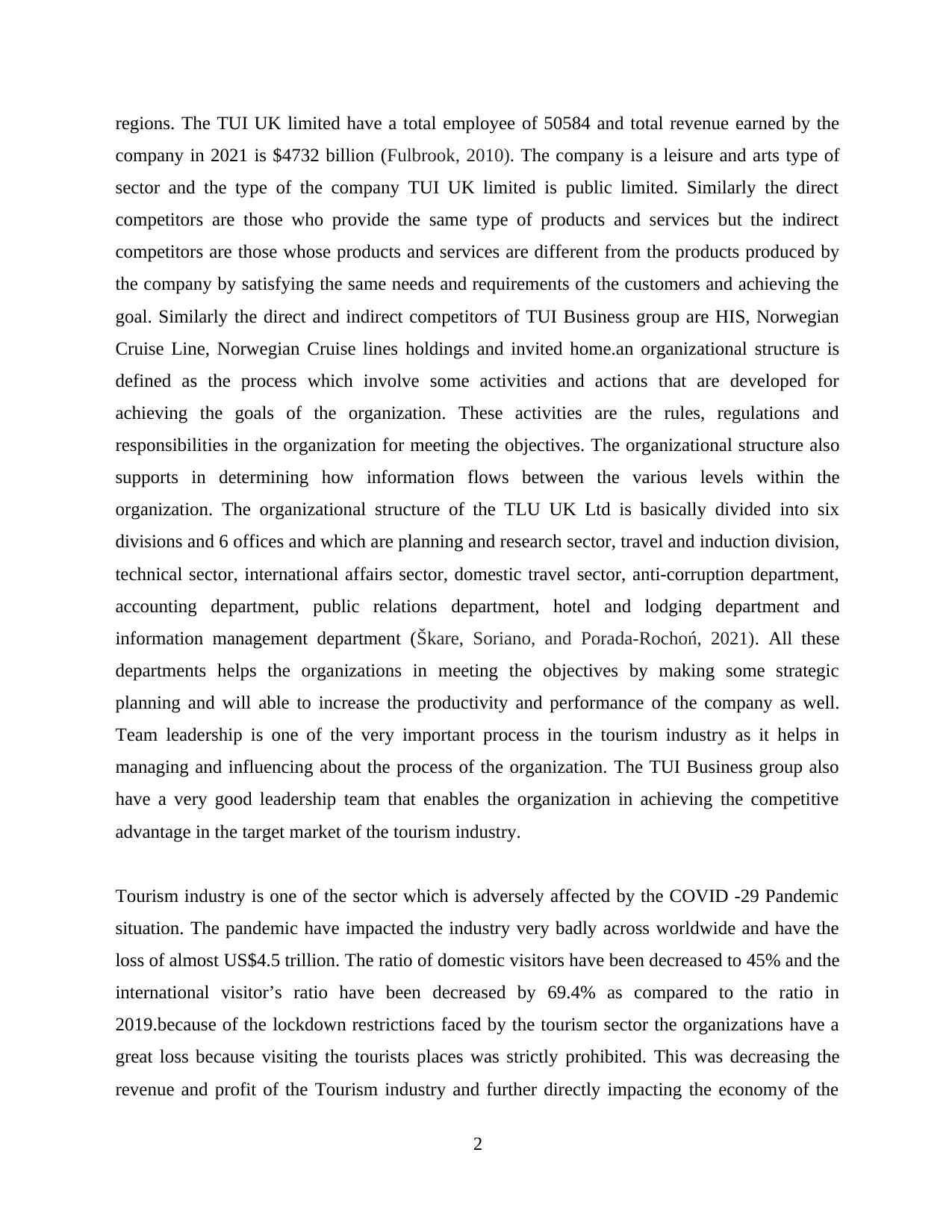
regions. The TUI UK limited have a total employee of 50584 and total revenue earned by the
company in 2021 is $4732 billion (Fulbrook, 2010). The company is a leisure and arts type of
sector and the type of the company TUI UK limited is public limited. Similarly the direct
competitors are those who provide the same type of products and services but the indirect
competitors are those whose products and services are different from the products produced by
the company by satisfying the same needs and requirements of the customers and achieving the
goal. Similarly the direct and indirect competitors of TUI Business group are HIS, Norwegian
Cruise Line, Norwegian Cruise lines holdings and invited home.an organizational structure is
defined as the process which involve some activities and actions that are developed for
achieving the goals of the organization. These activities are the rules, regulations and
responsibilities in the organization for meeting the objectives. The organizational structure also
supports in determining how information flows between the various levels within the
organization. The organizational structure of the TLU UK Ltd is basically divided into six
divisions and 6 offices and which are planning and research sector, travel and induction division,
technical sector, international affairs sector, domestic travel sector, anti-corruption department,
accounting department, public relations department, hotel and lodging department and
information management department (Škare, Soriano, and Porada-Rochoń, 2021). All these
departments helps the organizations in meeting the objectives by making some strategic
planning and will able to increase the productivity and performance of the company as well.
Team leadership is one of the very important process in the tourism industry as it helps in
managing and influencing about the process of the organization. The TUI Business group also
have a very good leadership team that enables the organization in achieving the competitive
advantage in the target market of the tourism industry.
Tourism industry is one of the sector which is adversely affected by the COVID -29 Pandemic
situation. The pandemic have impacted the industry very badly across worldwide and have the
loss of almost US$4.5 trillion. The ratio of domestic visitors have been decreased to 45% and the
international visitor’s ratio have been decreased by 69.4% as compared to the ratio in
2019.because of the lockdown restrictions faced by the tourism sector the organizations have a
great loss because visiting the tourists places was strictly prohibited. This was decreasing the
revenue and profit of the Tourism industry and further directly impacting the economy of the
2
company in 2021 is $4732 billion (Fulbrook, 2010). The company is a leisure and arts type of
sector and the type of the company TUI UK limited is public limited. Similarly the direct
competitors are those who provide the same type of products and services but the indirect
competitors are those whose products and services are different from the products produced by
the company by satisfying the same needs and requirements of the customers and achieving the
goal. Similarly the direct and indirect competitors of TUI Business group are HIS, Norwegian
Cruise Line, Norwegian Cruise lines holdings and invited home.an organizational structure is
defined as the process which involve some activities and actions that are developed for
achieving the goals of the organization. These activities are the rules, regulations and
responsibilities in the organization for meeting the objectives. The organizational structure also
supports in determining how information flows between the various levels within the
organization. The organizational structure of the TLU UK Ltd is basically divided into six
divisions and 6 offices and which are planning and research sector, travel and induction division,
technical sector, international affairs sector, domestic travel sector, anti-corruption department,
accounting department, public relations department, hotel and lodging department and
information management department (Škare, Soriano, and Porada-Rochoń, 2021). All these
departments helps the organizations in meeting the objectives by making some strategic
planning and will able to increase the productivity and performance of the company as well.
Team leadership is one of the very important process in the tourism industry as it helps in
managing and influencing about the process of the organization. The TUI Business group also
have a very good leadership team that enables the organization in achieving the competitive
advantage in the target market of the tourism industry.
Tourism industry is one of the sector which is adversely affected by the COVID -29 Pandemic
situation. The pandemic have impacted the industry very badly across worldwide and have the
loss of almost US$4.5 trillion. The ratio of domestic visitors have been decreased to 45% and the
international visitor’s ratio have been decreased by 69.4% as compared to the ratio in
2019.because of the lockdown restrictions faced by the tourism sector the organizations have a
great loss because visiting the tourists places was strictly prohibited. This was decreasing the
revenue and profit of the Tourism industry and further directly impacting the economy of the
2
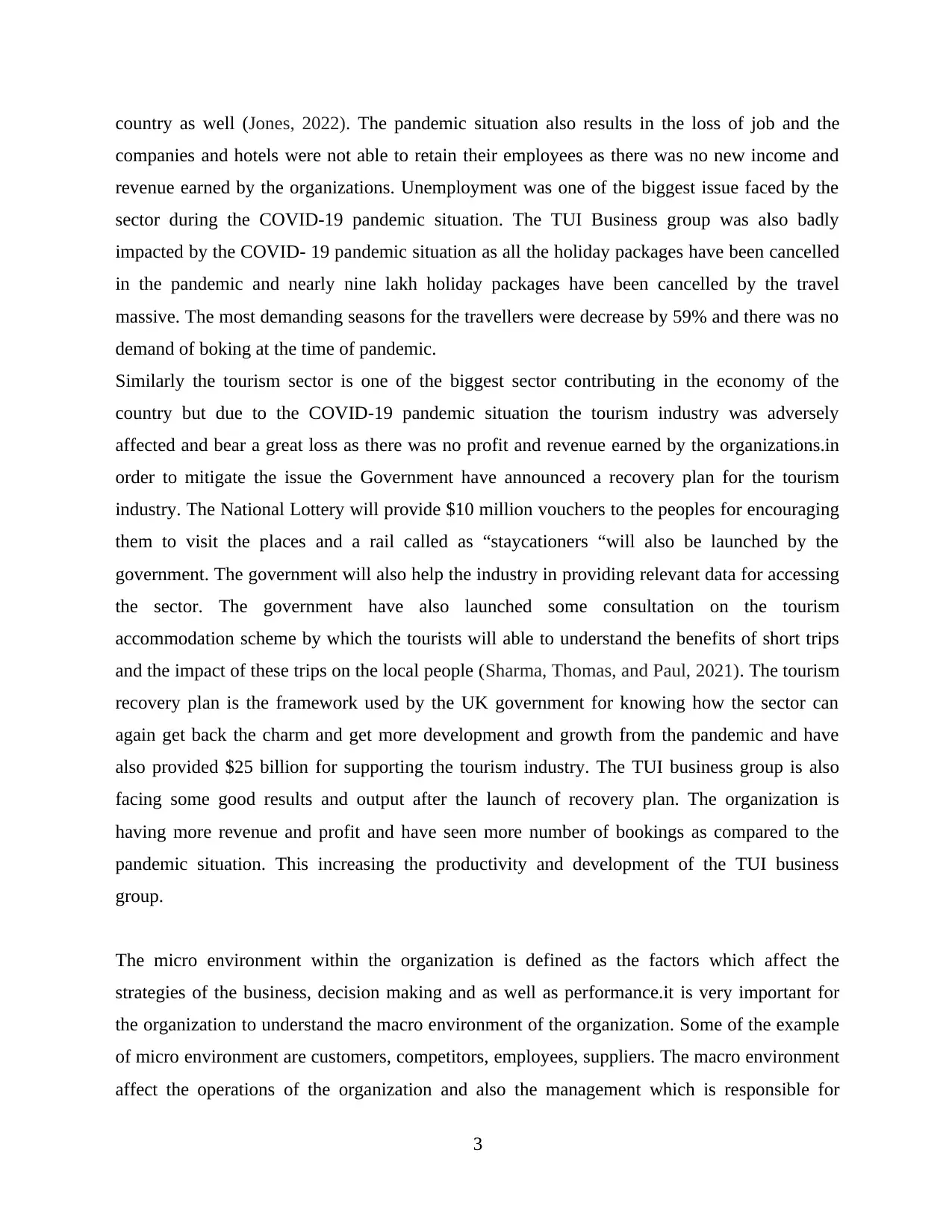
country as well (Jones, 2022). The pandemic situation also results in the loss of job and the
companies and hotels were not able to retain their employees as there was no new income and
revenue earned by the organizations. Unemployment was one of the biggest issue faced by the
sector during the COVID-19 pandemic situation. The TUI Business group was also badly
impacted by the COVID- 19 pandemic situation as all the holiday packages have been cancelled
in the pandemic and nearly nine lakh holiday packages have been cancelled by the travel
massive. The most demanding seasons for the travellers were decrease by 59% and there was no
demand of boking at the time of pandemic.
Similarly the tourism sector is one of the biggest sector contributing in the economy of the
country but due to the COVID-19 pandemic situation the tourism industry was adversely
affected and bear a great loss as there was no profit and revenue earned by the organizations.in
order to mitigate the issue the Government have announced a recovery plan for the tourism
industry. The National Lottery will provide $10 million vouchers to the peoples for encouraging
them to visit the places and a rail called as “staycationers “will also be launched by the
government. The government will also help the industry in providing relevant data for accessing
the sector. The government have also launched some consultation on the tourism
accommodation scheme by which the tourists will able to understand the benefits of short trips
and the impact of these trips on the local people (Sharma, Thomas, and Paul, 2021). The tourism
recovery plan is the framework used by the UK government for knowing how the sector can
again get back the charm and get more development and growth from the pandemic and have
also provided $25 billion for supporting the tourism industry. The TUI business group is also
facing some good results and output after the launch of recovery plan. The organization is
having more revenue and profit and have seen more number of bookings as compared to the
pandemic situation. This increasing the productivity and development of the TUI business
group.
The micro environment within the organization is defined as the factors which affect the
strategies of the business, decision making and as well as performance.it is very important for
the organization to understand the macro environment of the organization. Some of the example
of micro environment are customers, competitors, employees, suppliers. The macro environment
affect the operations of the organization and also the management which is responsible for
3
companies and hotels were not able to retain their employees as there was no new income and
revenue earned by the organizations. Unemployment was one of the biggest issue faced by the
sector during the COVID-19 pandemic situation. The TUI Business group was also badly
impacted by the COVID- 19 pandemic situation as all the holiday packages have been cancelled
in the pandemic and nearly nine lakh holiday packages have been cancelled by the travel
massive. The most demanding seasons for the travellers were decrease by 59% and there was no
demand of boking at the time of pandemic.
Similarly the tourism sector is one of the biggest sector contributing in the economy of the
country but due to the COVID-19 pandemic situation the tourism industry was adversely
affected and bear a great loss as there was no profit and revenue earned by the organizations.in
order to mitigate the issue the Government have announced a recovery plan for the tourism
industry. The National Lottery will provide $10 million vouchers to the peoples for encouraging
them to visit the places and a rail called as “staycationers “will also be launched by the
government. The government will also help the industry in providing relevant data for accessing
the sector. The government have also launched some consultation on the tourism
accommodation scheme by which the tourists will able to understand the benefits of short trips
and the impact of these trips on the local people (Sharma, Thomas, and Paul, 2021). The tourism
recovery plan is the framework used by the UK government for knowing how the sector can
again get back the charm and get more development and growth from the pandemic and have
also provided $25 billion for supporting the tourism industry. The TUI business group is also
facing some good results and output after the launch of recovery plan. The organization is
having more revenue and profit and have seen more number of bookings as compared to the
pandemic situation. This increasing the productivity and development of the TUI business
group.
The micro environment within the organization is defined as the factors which affect the
strategies of the business, decision making and as well as performance.it is very important for
the organization to understand the macro environment of the organization. Some of the example
of micro environment are customers, competitors, employees, suppliers. The macro environment
affect the operations of the organization and also the management which is responsible for
3
⊘ This is a preview!⊘
Do you want full access?
Subscribe today to unlock all pages.

Trusted by 1+ million students worldwide
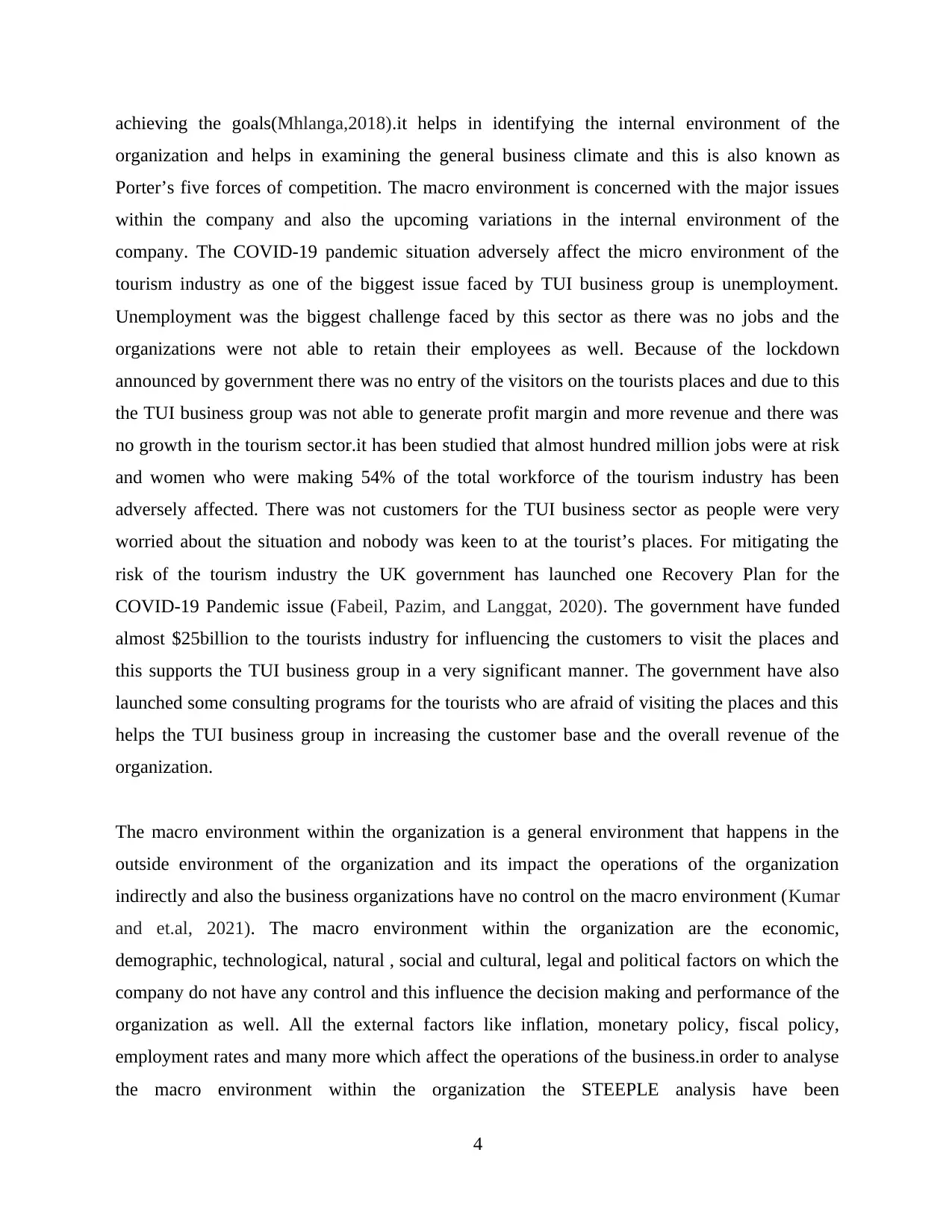
achieving the goals(Mhlanga,2018).it helps in identifying the internal environment of the
organization and helps in examining the general business climate and this is also known as
Porter’s five forces of competition. The macro environment is concerned with the major issues
within the company and also the upcoming variations in the internal environment of the
company. The COVID-19 pandemic situation adversely affect the micro environment of the
tourism industry as one of the biggest issue faced by TUI business group is unemployment.
Unemployment was the biggest challenge faced by this sector as there was no jobs and the
organizations were not able to retain their employees as well. Because of the lockdown
announced by government there was no entry of the visitors on the tourists places and due to this
the TUI business group was not able to generate profit margin and more revenue and there was
no growth in the tourism sector.it has been studied that almost hundred million jobs were at risk
and women who were making 54% of the total workforce of the tourism industry has been
adversely affected. There was not customers for the TUI business sector as people were very
worried about the situation and nobody was keen to at the tourist’s places. For mitigating the
risk of the tourism industry the UK government has launched one Recovery Plan for the
COVID-19 Pandemic issue (Fabeil, Pazim, and Langgat, 2020). The government have funded
almost $25billion to the tourists industry for influencing the customers to visit the places and
this supports the TUI business group in a very significant manner. The government have also
launched some consulting programs for the tourists who are afraid of visiting the places and this
helps the TUI business group in increasing the customer base and the overall revenue of the
organization.
The macro environment within the organization is a general environment that happens in the
outside environment of the organization and its impact the operations of the organization
indirectly and also the business organizations have no control on the macro environment (Kumar
and et.al, 2021). The macro environment within the organization are the economic,
demographic, technological, natural , social and cultural, legal and political factors on which the
company do not have any control and this influence the decision making and performance of the
organization as well. All the external factors like inflation, monetary policy, fiscal policy,
employment rates and many more which affect the operations of the business.in order to analyse
the macro environment within the organization the STEEPLE analysis have been
4
organization and helps in examining the general business climate and this is also known as
Porter’s five forces of competition. The macro environment is concerned with the major issues
within the company and also the upcoming variations in the internal environment of the
company. The COVID-19 pandemic situation adversely affect the micro environment of the
tourism industry as one of the biggest issue faced by TUI business group is unemployment.
Unemployment was the biggest challenge faced by this sector as there was no jobs and the
organizations were not able to retain their employees as well. Because of the lockdown
announced by government there was no entry of the visitors on the tourists places and due to this
the TUI business group was not able to generate profit margin and more revenue and there was
no growth in the tourism sector.it has been studied that almost hundred million jobs were at risk
and women who were making 54% of the total workforce of the tourism industry has been
adversely affected. There was not customers for the TUI business sector as people were very
worried about the situation and nobody was keen to at the tourist’s places. For mitigating the
risk of the tourism industry the UK government has launched one Recovery Plan for the
COVID-19 Pandemic issue (Fabeil, Pazim, and Langgat, 2020). The government have funded
almost $25billion to the tourists industry for influencing the customers to visit the places and
this supports the TUI business group in a very significant manner. The government have also
launched some consulting programs for the tourists who are afraid of visiting the places and this
helps the TUI business group in increasing the customer base and the overall revenue of the
organization.
The macro environment within the organization is a general environment that happens in the
outside environment of the organization and its impact the operations of the organization
indirectly and also the business organizations have no control on the macro environment (Kumar
and et.al, 2021). The macro environment within the organization are the economic,
demographic, technological, natural , social and cultural, legal and political factors on which the
company do not have any control and this influence the decision making and performance of the
organization as well. All the external factors like inflation, monetary policy, fiscal policy,
employment rates and many more which affect the operations of the business.in order to analyse
the macro environment within the organization the STEEPLE analysis have been
4
Paraphrase This Document
Need a fresh take? Get an instant paraphrase of this document with our AI Paraphraser
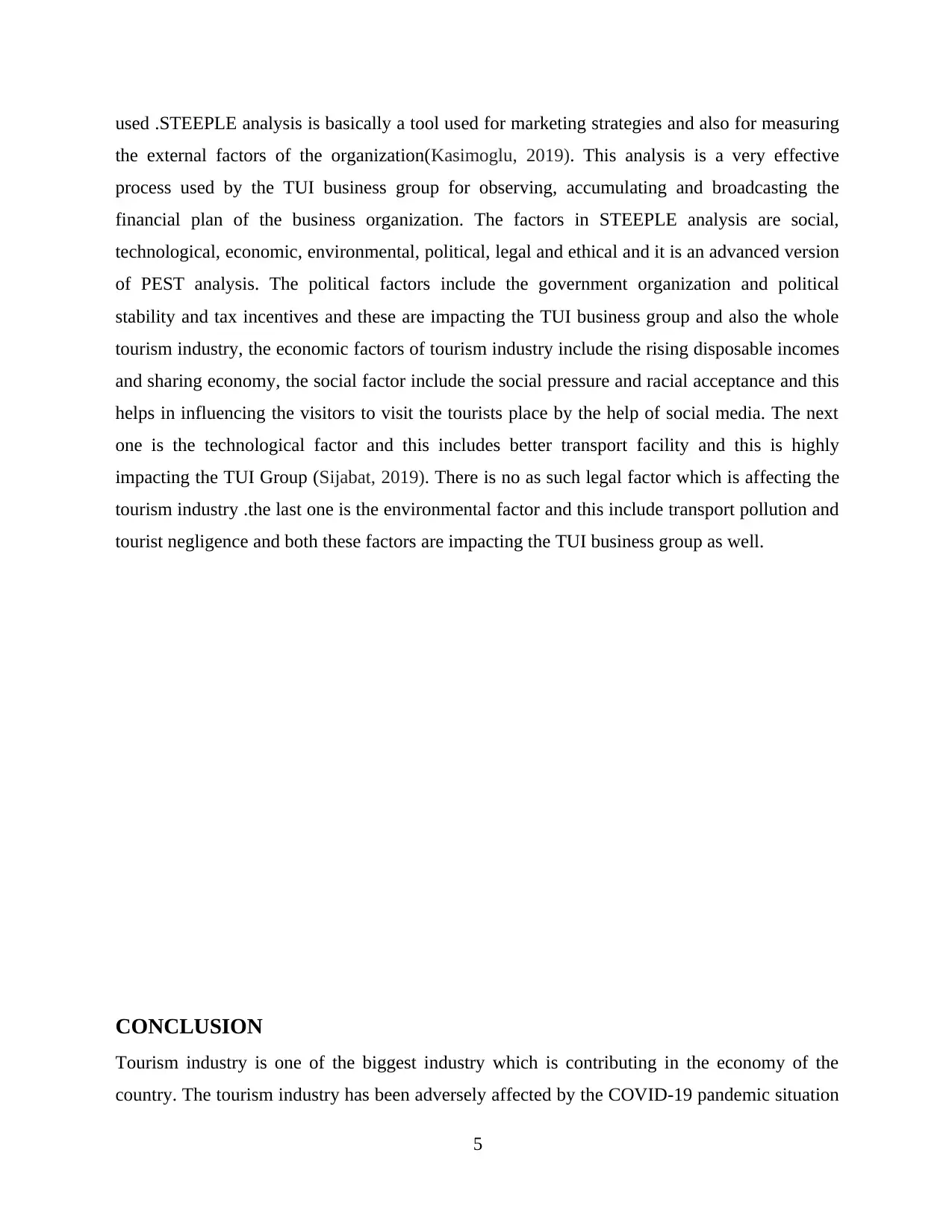
used .STEEPLE analysis is basically a tool used for marketing strategies and also for measuring
the external factors of the organization(Kasimoglu, 2019). This analysis is a very effective
process used by the TUI business group for observing, accumulating and broadcasting the
financial plan of the business organization. The factors in STEEPLE analysis are social,
technological, economic, environmental, political, legal and ethical and it is an advanced version
of PEST analysis. The political factors include the government organization and political
stability and tax incentives and these are impacting the TUI business group and also the whole
tourism industry, the economic factors of tourism industry include the rising disposable incomes
and sharing economy, the social factor include the social pressure and racial acceptance and this
helps in influencing the visitors to visit the tourists place by the help of social media. The next
one is the technological factor and this includes better transport facility and this is highly
impacting the TUI Group (Sijabat, 2019). There is no as such legal factor which is affecting the
tourism industry .the last one is the environmental factor and this include transport pollution and
tourist negligence and both these factors are impacting the TUI business group as well.
CONCLUSION
Tourism industry is one of the biggest industry which is contributing in the economy of the
country. The tourism industry has been adversely affected by the COVID-19 pandemic situation
5
the external factors of the organization(Kasimoglu, 2019). This analysis is a very effective
process used by the TUI business group for observing, accumulating and broadcasting the
financial plan of the business organization. The factors in STEEPLE analysis are social,
technological, economic, environmental, political, legal and ethical and it is an advanced version
of PEST analysis. The political factors include the government organization and political
stability and tax incentives and these are impacting the TUI business group and also the whole
tourism industry, the economic factors of tourism industry include the rising disposable incomes
and sharing economy, the social factor include the social pressure and racial acceptance and this
helps in influencing the visitors to visit the tourists place by the help of social media. The next
one is the technological factor and this includes better transport facility and this is highly
impacting the TUI Group (Sijabat, 2019). There is no as such legal factor which is affecting the
tourism industry .the last one is the environmental factor and this include transport pollution and
tourist negligence and both these factors are impacting the TUI business group as well.
CONCLUSION
Tourism industry is one of the biggest industry which is contributing in the economy of the
country. The tourism industry has been adversely affected by the COVID-19 pandemic situation
5
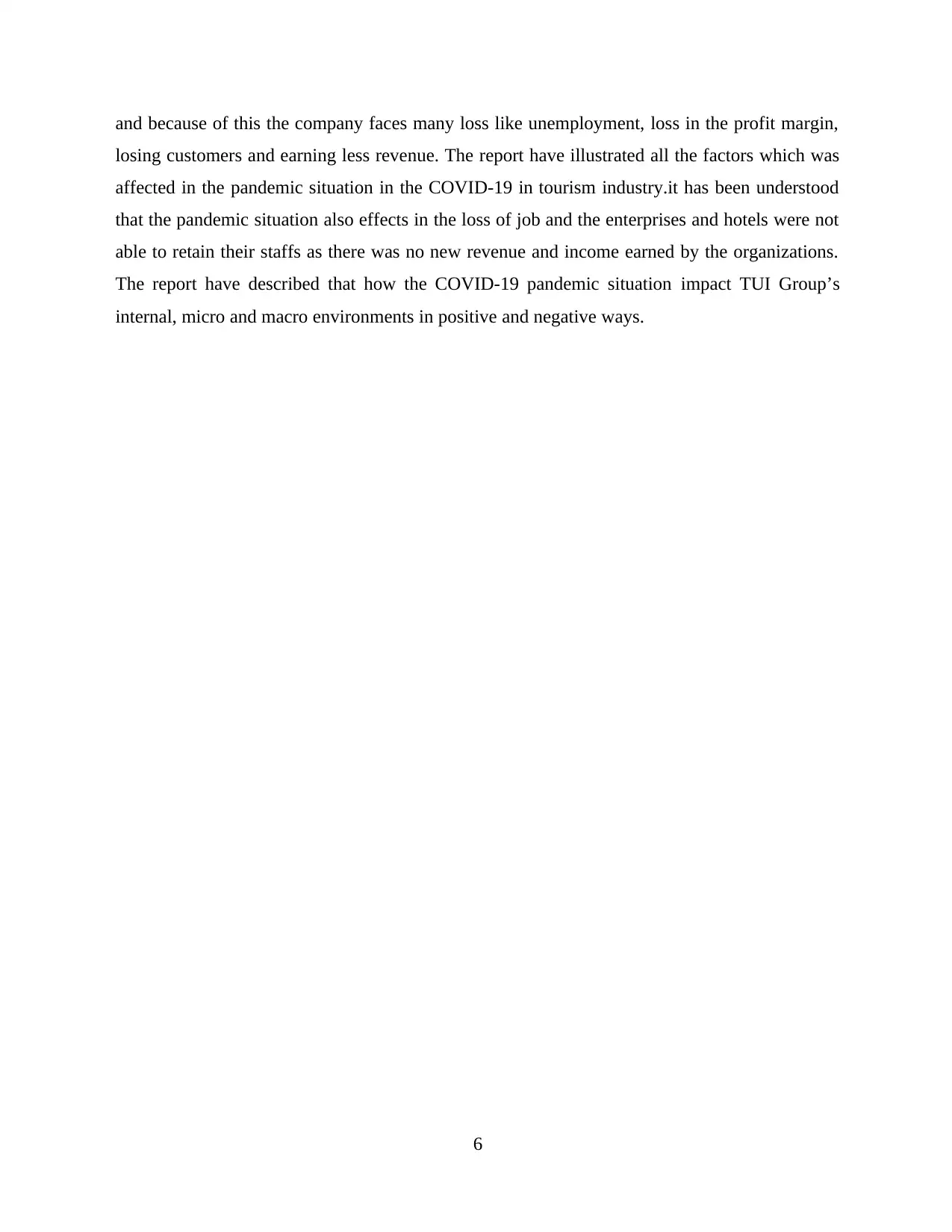
and because of this the company faces many loss like unemployment, loss in the profit margin,
losing customers and earning less revenue. The report have illustrated all the factors which was
affected in the pandemic situation in the COVID-19 in tourism industry.it has been understood
that the pandemic situation also effects in the loss of job and the enterprises and hotels were not
able to retain their staffs as there was no new revenue and income earned by the organizations.
The report have described that how the COVID-19 pandemic situation impact TUI Group’s
internal, micro and macro environments in positive and negative ways.
6
losing customers and earning less revenue. The report have illustrated all the factors which was
affected in the pandemic situation in the COVID-19 in tourism industry.it has been understood
that the pandemic situation also effects in the loss of job and the enterprises and hotels were not
able to retain their staffs as there was no new revenue and income earned by the organizations.
The report have described that how the COVID-19 pandemic situation impact TUI Group’s
internal, micro and macro environments in positive and negative ways.
6
⊘ This is a preview!⊘
Do you want full access?
Subscribe today to unlock all pages.

Trusted by 1+ million students worldwide
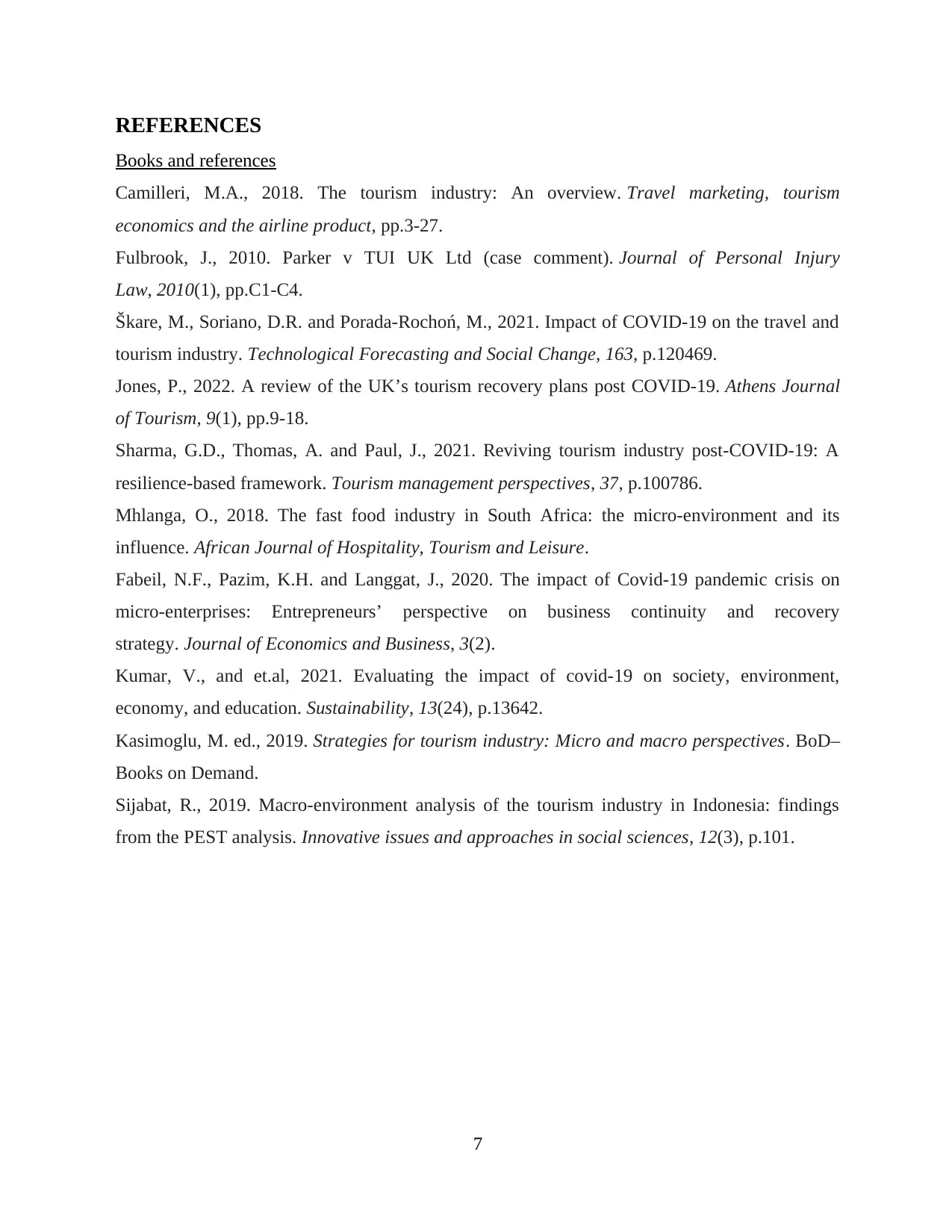
REFERENCES
Books and references
Camilleri, M.A., 2018. The tourism industry: An overview. Travel marketing, tourism
economics and the airline product, pp.3-27.
Fulbrook, J., 2010. Parker v TUI UK Ltd (case comment). Journal of Personal Injury
Law, 2010(1), pp.C1-C4.
Škare, M., Soriano, D.R. and Porada-Rochoń, M., 2021. Impact of COVID-19 on the travel and
tourism industry. Technological Forecasting and Social Change, 163, p.120469.
Jones, P., 2022. A review of the UK’s tourism recovery plans post COVID-19. Athens Journal
of Tourism, 9(1), pp.9-18.
Sharma, G.D., Thomas, A. and Paul, J., 2021. Reviving tourism industry post-COVID-19: A
resilience-based framework. Tourism management perspectives, 37, p.100786.
Mhlanga, O., 2018. The fast food industry in South Africa: the micro-environment and its
influence. African Journal of Hospitality, Tourism and Leisure.
Fabeil, N.F., Pazim, K.H. and Langgat, J., 2020. The impact of Covid-19 pandemic crisis on
micro-enterprises: Entrepreneurs’ perspective on business continuity and recovery
strategy. Journal of Economics and Business, 3(2).
Kumar, V., and et.al, 2021. Evaluating the impact of covid-19 on society, environment,
economy, and education. Sustainability, 13(24), p.13642.
Kasimoglu, M. ed., 2019. Strategies for tourism industry: Micro and macro perspectives. BoD–
Books on Demand.
Sijabat, R., 2019. Macro-environment analysis of the tourism industry in Indonesia: findings
from the PEST analysis. Innovative issues and approaches in social sciences, 12(3), p.101.
7
Books and references
Camilleri, M.A., 2018. The tourism industry: An overview. Travel marketing, tourism
economics and the airline product, pp.3-27.
Fulbrook, J., 2010. Parker v TUI UK Ltd (case comment). Journal of Personal Injury
Law, 2010(1), pp.C1-C4.
Škare, M., Soriano, D.R. and Porada-Rochoń, M., 2021. Impact of COVID-19 on the travel and
tourism industry. Technological Forecasting and Social Change, 163, p.120469.
Jones, P., 2022. A review of the UK’s tourism recovery plans post COVID-19. Athens Journal
of Tourism, 9(1), pp.9-18.
Sharma, G.D., Thomas, A. and Paul, J., 2021. Reviving tourism industry post-COVID-19: A
resilience-based framework. Tourism management perspectives, 37, p.100786.
Mhlanga, O., 2018. The fast food industry in South Africa: the micro-environment and its
influence. African Journal of Hospitality, Tourism and Leisure.
Fabeil, N.F., Pazim, K.H. and Langgat, J., 2020. The impact of Covid-19 pandemic crisis on
micro-enterprises: Entrepreneurs’ perspective on business continuity and recovery
strategy. Journal of Economics and Business, 3(2).
Kumar, V., and et.al, 2021. Evaluating the impact of covid-19 on society, environment,
economy, and education. Sustainability, 13(24), p.13642.
Kasimoglu, M. ed., 2019. Strategies for tourism industry: Micro and macro perspectives. BoD–
Books on Demand.
Sijabat, R., 2019. Macro-environment analysis of the tourism industry in Indonesia: findings
from the PEST analysis. Innovative issues and approaches in social sciences, 12(3), p.101.
7
1 out of 10
Related Documents
Your All-in-One AI-Powered Toolkit for Academic Success.
+13062052269
info@desklib.com
Available 24*7 on WhatsApp / Email
![[object Object]](/_next/static/media/star-bottom.7253800d.svg)
Unlock your academic potential
Copyright © 2020–2025 A2Z Services. All Rights Reserved. Developed and managed by ZUCOL.




